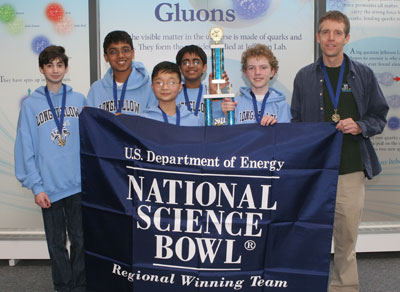
NEWPORT NEWS, Va. – For the second year running, a team from Longfellow Middle School, Falls Church, won the Virginia Regional Middle School Science Bowl.
The academic competition, held March 5 at the U.S. Department of Energy's Jefferson Lab in Newport News, drew 18 teams from across Virginia. All 18 teams competed in the morning round-robin matches. Eight teams moved on to the afternoon's double-elimination finals.
In the end, Longfellow, coached by James Bradford, finished in first place and took home a team trophy, a banner to carry to the Science Bowl Nationals, a $750 check for its school and individual medals. The team also won an expenses-paid trip to the Science Bowl Nationals to be held in Washington, D.C. April 28 to May 2.
Finishing in second was Gildersleeve Middle School of Newport News coached by Timothy Criner. The team won $500 for its school and a team trophy. Third place, which included $300 for its school and a team trophy, went to Chancellor Middle School of Fredericksburg, coached by Gary Graham. The Sciencekidsclub, Centreville, coached by Sreevani Putalapattu, placed fourth and came away with a team trophy.
The 10 teams that didn't advance to the playoffs were invited to participate in the Stay All Day Contest – two math, science and engineering challenges. Winning the Stay All Day Contest, with the best combined results from the challenges, was Rachel Carson Middle School, Herndon, coached by Frank Tarrant. The team received $300 for its school.
The National Science Bowl tournament – sponsored by the U.S. Department of Energy since 1991 – is an annual academic competition among teams of students. The teams face off in an intense question-and-answer format where contestants are quizzed on their knowledge in all science disciplines, including earth and space science, biology, chemistry, general science, mathematics and physics. A new category was added this year: energy.
Learn more about DOE's annual National Science Bowl competition at: http://www.scied.science.doe.gov/nsb/
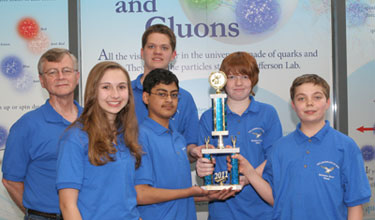 Gildersleeve Middle School, Newport News, took second place at the 2011 Virginia Regional Middle School Science Bowl held March 5 at Jefferson Lab. Pictured, left to right, are Coach Timothy Criner and team members Lindsey Ball, Rakshith Raghu, Keaton Lee (back), Frank May and Ben Lambert. Photo: Steve Gagnon, JLab
|
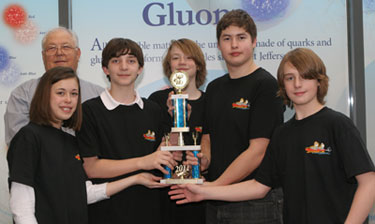 The team from Chancellor Middle School, Fredericksburg, placed third at the 2011 Virginia Regional Middle School Science Bowl held March 5 at Jefferson Lab. Pictured, left to right, are Natalie Wilson, Coach Gary Graham, Jared Pearlman, Michael Scott, James Irwin and Tyler Nielsen. Photo: Steve Gagnon, JLab
|
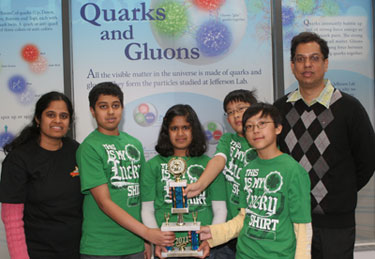 The Sciencekidsclub, from Centreville, finished in fourth place at the 2011 Virginia Regional Middle School Science Bowl held March 5 at Jefferson Lab. Pictured, left to right, are Coach Sreevani Putalapattu, team mates Jagan Doodala, Vooha Putalapattu, Hans Li and Alec Zhang and Coach Srinivas Doodala. Photo: Steve Gagnon, JLab
|
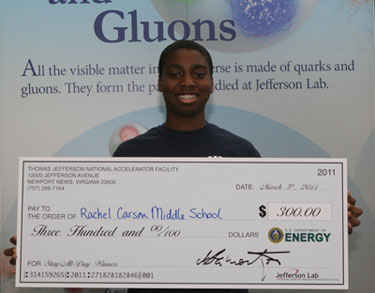 The Stay All Day Contest – a problem solving challenge – was won by the team from Rachel Carson Middle School, Herndon, coached by Frank Tarrant. Pictured here with the prize, a $300 check for their school is team member Kwabena Ofori-Atta. Photo: Steve Gagnon, JLab
|

